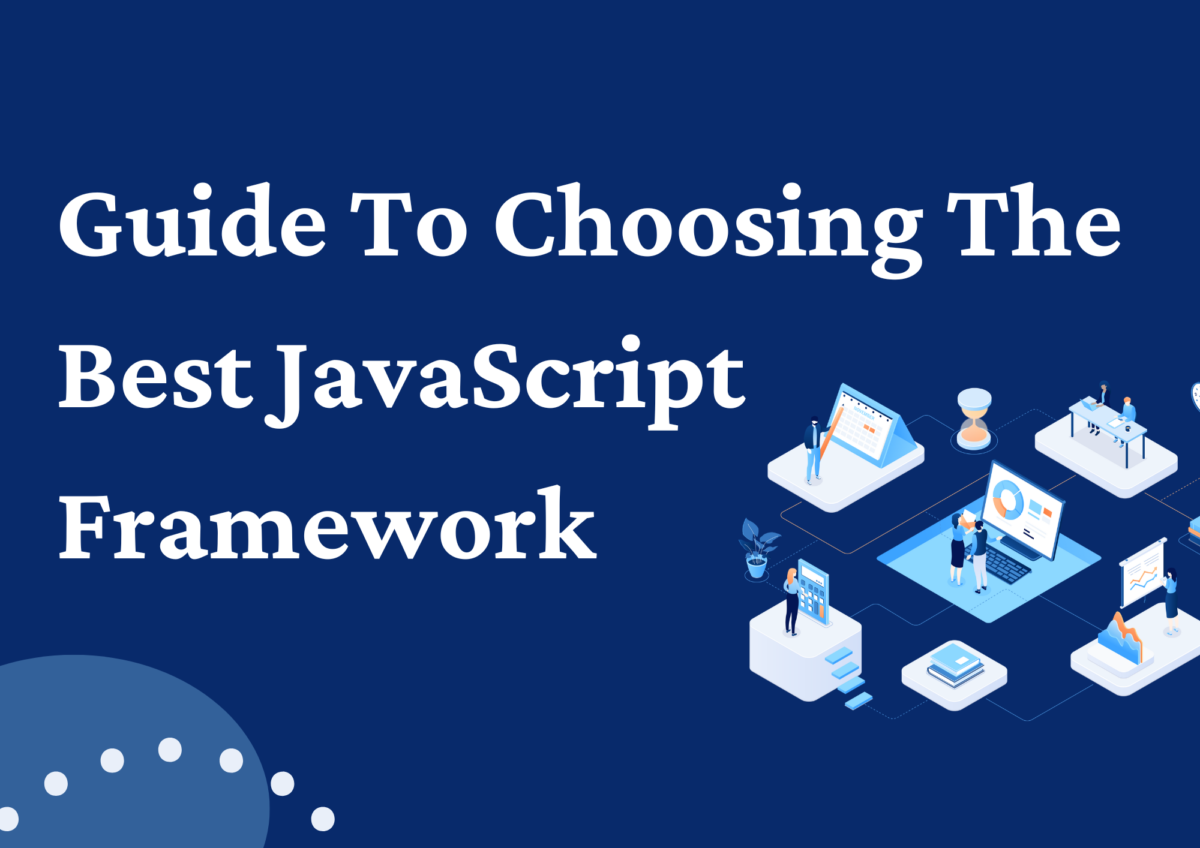This website uses cookies so that we can provide you with the best user experience possible. Cookie information is stored in your browser and performs functions such as recognising you when you return to our website and helping our team to understand which sections of the website you find most interesting and useful.
A Beginner’s Guide to Choosing the Best JavaScript Framework

If you’re looking to develop a web application using JavaScript, you’ll be faced with the task of choosing a JavaScript framework. A framework helps you organize and structure your code, making it easier to build complex applications. But with so many JavaScript frameworks available, it can be overwhelming to decide which one to use. In this article, we’ll provide an overview of popular JavaScript frameworks and the key features to look for when choosing the best one for your project.
Understanding JavaScript Frameworks
A JavaScript framework is a library of pre-written code that developers can use to build web applications. It provides a structure and set of tools to create user interfaces, handle data, and manage the application’s logic. Frameworks help streamline the development process by providing a consistent way to solve common problems. This allows developers to focus on the unique aspects of their project and write less code than they would need to from scratch.
What is a JavaScript Framework?
JavaScript frameworks are designed to make it easier to build web applications. They provide a set of tools and abstractions to help developers write less code, while still being able to create complex applications with ease. Frameworks help structure your code and provide patterns for common tasks, such as handling user input or making network requests.
One of the key benefits of using a JavaScript framework is that it can help you build scalable applications. By using a framework, you can break your application down into smaller, more manageable pieces, which makes it easier to maintain over time. Additionally, frameworks often come with built-in tools for testing and debugging your code, which can save you a lot of time and effort in the long run.
Why Use a JavaScript Framework?

Using a JavaScript framework can save you a lot of time and effort when building a web application. By relying on pre-written code and well-established patterns, developers can focus on the unique aspects of their project rather than spending time building generic features that are already provided by the framework. Additionally, frameworks often have a large and active community of developers who contribute to its development and help maintain it over time.
Another key benefit of using a JavaScript framework is that it can help you build more maintainable code. By using a framework, you can take advantage of established best practices and coding patterns, which can make it easier for other developers to understand and work with your code. This can be especially important as your application grows and becomes more complex.
Key Features of JavaScript Frameworks
When choosing a JavaScript framework, there are several key features that you should consider:
- Modularity: The ability to break your application into smaller, self-contained modules. This can make it easier to manage your code and ensure that each piece of your application is working correctly.
- Component-based architecture: The use of reusable components to build user interfaces. This can help you create more scalable and maintainable code, as well as make it easier to reuse pieces of your application in different contexts.
- Virtual DOM: A lightweight representation of the actual DOM that helps optimize performance. This can make your application faster and more responsive, especially when dealing with large amounts of data.
- State management: Tools for managing application state, such as Redux or MobX. This can help you keep track of the current state of your application and make it easier to manage complex data flows.
- Routing: A system for handling application routing and navigation. This can make it easier to build complex, multi-page applications and ensure that users can easily navigate between different parts of your application.
- Testing: Built-in tools for testing your application. This can help you catch bugs and ensure that your application is working correctly before you deploy it to production.
By considering these key features when choosing a JavaScript framework, you can ensure that you select a tool that meets your specific needs and helps you build high-quality, scalable web applications.
Popular JavaScript Frameworks
JavaScript frameworks are a set of pre-written JavaScript code that helps developers in building web applications. These frameworks are designed to simplify the development process by providing a structure for organizing code, creating user interfaces, and managing application state. Now that you understand what JavaScript frameworks are and why you might use them, let’s take a look at some popular options:
Angular
Angular is a popular framework for developing single-page applications. It was created by Google and is widely used for building complex web applications. Angular provides a complete set of tools for building complex user interfaces, including templates, data binding, and routing. It uses a component-based architecture that makes it easy to break your application into smaller, reusable pieces.
One of the main benefits of using Angular is that it is highly scalable. This means that it can be used to build small applications as well as large, enterprise-level applications. Angular also has a large community of developers who contribute to the framework and provide support for other developers.
React
React is a lightweight library for building user interfaces. It was created by Facebook and is widely used for building web applications. React allows developers to create reusable UI components that can be composed together to build complex interfaces. It uses a virtual DOM to optimize performance and provides a simple API for managing application state.
One of the main benefits of using React is that it is highly flexible. This means that it can be used to build a wide range of applications, from simple one-page sites to complex web applications. React also has a large community of developers who contribute to the library and provide support for other developers.
Vue.js
Vue.js is a progressive JavaScript framework that focuses on building user interfaces. It provides a flexible set of tools for building both simple and complex applications. Vue.js uses a component-based architecture and provides a simple and easy-to-learn API.
One of the main benefits of using Vue.js is that it is highly customizable. This means that it can be used to build applications that meet specific business requirements. Vue.js also has a growing community of developers who contribute to the framework and provide support for other developers.
Ember.js
Ember.js is a mature framework for building ambitious web applications. It provides a complete set of tools for building complex user interfaces, including a powerful templating system, data binding, and routing. Ember.js uses a convention-over-configuration approach that makes it easy to build applications quickly.
One of the main benefits of using Ember.js is that it is highly opinionated. This means that it provides a clear structure for organizing code and building applications. Ember.js also has a dedicated community of developers who contribute to the framework and provide support for other developers.
Backbone.js
Backbone.js is a lightweight framework for building single-page applications. It provides a minimal set of tools for organizing your code and building UI components. Backbone.js is known for its simplicity and flexibility, making it a good choice for smaller projects.
One of the main benefits of using Backbone.js is that it is highly modular. This means that you can use only the parts of the framework that you need, without being tied to a specific architecture. Backbone.js also has a small but dedicated community of developers who contribute to the framework and provide support for other developers.
Comparing the Top JavaScript Frameworks
Choosing the right JavaScript framework for your project can be a daunting task. With so many options available, it’s important to understand the trade-offs and considerations for each one. In this article, we’ll compare some of the most popular JavaScript frameworks and explore their strengths and weaknesses.
Performance
When it comes to performance, there are trade-offs to consider. Angular and Ember.js provide more tools and abstractions to manage your application, but this can come at the cost of performance. These frameworks are designed to handle large, complex applications with many moving parts. However, if your application is smaller or simpler, you may not need all of the features that these frameworks provide. In contrast, React and Vue.js are more lightweight and optimized for performance. They are designed to be fast and efficient, but may require more work to build complex applications.
It’s important to note that performance is not just about speed. It’s also about how well your application scales and how easy it is to maintain. A framework that is fast but difficult to work with may not be the best choice for your project.
Learning Curve
The learning curve for JavaScript frameworks varies based on how much experience you have with JavaScript and web development. React and Vue.js have a lower barrier to entry and are easy to learn. They use familiar concepts like components and props, and their documentation is clear and concise. On the other hand, Angular and Ember.js have a steeper learning curve. They are more opinionated and require a deeper understanding of web development concepts like dependency injection and data binding.
That being said, the learning curve for any framework can be reduced with good documentation and a supportive community. Don’t be afraid to ask questions and seek help when you need it.
Community Support
The size and activity of a framework’s community can impact its longevity and reliability. Angular and React have large, active communities of developers. This means that there are many resources available for learning and problem-solving, and the framework is likely to be around for a long time. Vue.js and Ember.js have smaller but dedicated communities. While these frameworks may not have as many resources available, their communities are passionate and committed to their success.
When choosing a framework, it’s important to consider the community support and the resources that are available to you. A framework with a large and active community may be a better choice if you’re looking for long-term support and reliability.
Ecosystem and Libraries
The ecosystem and libraries available for a framework can impact its flexibility and power. Angular and Ember.js have well-established ecosystems with many plugins and libraries available. These frameworks are designed to handle large and complex applications, and their ecosystems reflect that. React and Vue.js have smaller but growing ecosystems. These frameworks are more lightweight and flexible, and their ecosystems reflect that as well.
When choosing a framework, it’s important to consider the ecosystem and libraries available to you. A framework with a robust ecosystem may be a better choice if you’re looking for flexibility and power.
Flexibility and Scalability
The flexibility and scalability of a JavaScript framework are important for future-proofing your application. Angular and Ember.js provide robust features and structures for building complex applications. They are designed to be scalable and maintainable over time. React and Vue.js are more lightweight and flexible. They are designed to be easy to work with and to adapt to changing requirements.
When choosing a framework, consider your project’s requirements and future growth. A framework that is flexible and scalable may be a better choice if you’re planning on expanding your application over time.
In conclusion, choosing the right JavaScript framework for your project requires careful consideration of many factors. By understanding the trade-offs and considerations for each framework, you can make an informed decision that will set your project up for success.
Conclusion
Choosing the best JavaScript framework for your project is an important decision that can impact the success of your application. Consider the trade-offs between flexibility, performance, and ease of use when selecting a framework, and be sure to evaluate the key features and requirements that are most important for your project. With careful consideration, you can choose the right JavaScript framework to help you build faster, more powerful web applications.




